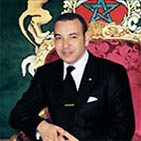Morocco's king launches offensive against radical Islam
 Rabat, Morocco - Islamic law allows men to wed girls as young as nine years, because marriages to younger women often work out better - or so claims Moroccan theologist Mohammed Maghraoui.
Rabat, Morocco - Islamic law allows men to wed girls as young as nine years, because marriages to younger women often work out better - or so claims Moroccan theologist Mohammed Maghraoui.
The fatwa (opinion on religious law) issued by Maghraoui in Marrakesh in early September confirmed what King Mohammed VI already knew: that Islamist fundamentalism was on the rise in the traditionally relatively liberal north African country.
The Superior Council of Ulemas (Islamic scholars) condemned the fatwa, and Maghraoui's website as well as dozens of Koranic schools linked to him were closed.
Some weeks later, just as Moroccans were marking the revelation of the Koran to Prophet Mohammed at the close of the holy month of Ramadan, King Mohammed launched his second religious reform.
The faith of Moroccans needed to be preserved from "extremist impulses," the monarch said in the northern city of Tetouan, announcing a string of measures towards that end.
As the Amir al-Mu'amin or Commander of the Faithful, the 45-year-old king, who is believed to descend from Prophet Mohammed, is the official leader of Moroccan Muslims.
The new reform followed an initial one carried out after Islamist militants killed 45 people, including 12 suicide bombers, in Casablanca in 2003.
That reform restructured the Ministry of Islamic Affairs in an attempt to place preachers at the country's 40,000 mosques under tighter control.
Other measures have included revising Islamic textbooks and placing female instructors at mosques.
The new reform establishes 69 regional or provincial councils of ulemas to guarantee "spiritual security" and to preserve the "tolerant Sunni Islam" that is part of the "Moroccan identity," as King Mohammed said.
The councils are to update the training of imams, whose medical benefits and living standards will also be improved, alongside those of other mosque personnel.
A separate council of ulemas will watch over the more than 3 million Moroccans living abroad, whose situation as immigrants is seen as making them particularly vulnerable to extremism.
Morocco is trying to stem radicalism with a two-track approach, combining attempts to promote a tolerant brand of Islam with the detentions of thousands of extremist suspects.
The arrests have elicited criticism from human rights groups, which say that the secret service has abducted dozens of suspects illegally, taking them to detention centres such as the ill-famed Temara near the capital Rabat.
Police have also cracked down on non-violent Islamist movements, such as the non-parliamentary al-Adl w'al-Ihsan (Justice and Spirituality), which many analysts regard as Morocco's biggest de-facto political party.
Through the new reform, King Mohammed was emphasizing his position as the country's religious leader against "self-proclaimed religious authorities," Rachid Benzine, an expert based at the Aix-en-Province Institute of Political Studies, told the French daily Le Monde.
It was difficult, however, for the palace to curb the spread of Islamic radicalism through the internet and some Gulf-based television stations, Benzine observed.
Some radical preachers "operate like Protestant tele-preachers," he explained.
"In these conditions, nothing guarantees that the answers given (by the political authorities) have chances of being heard," Benzine concluded. (dpa)